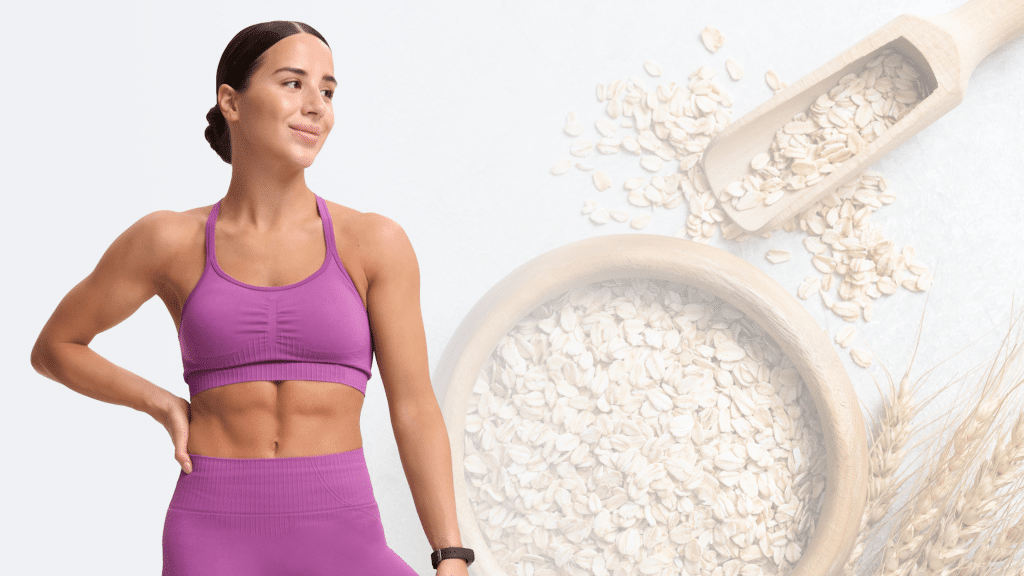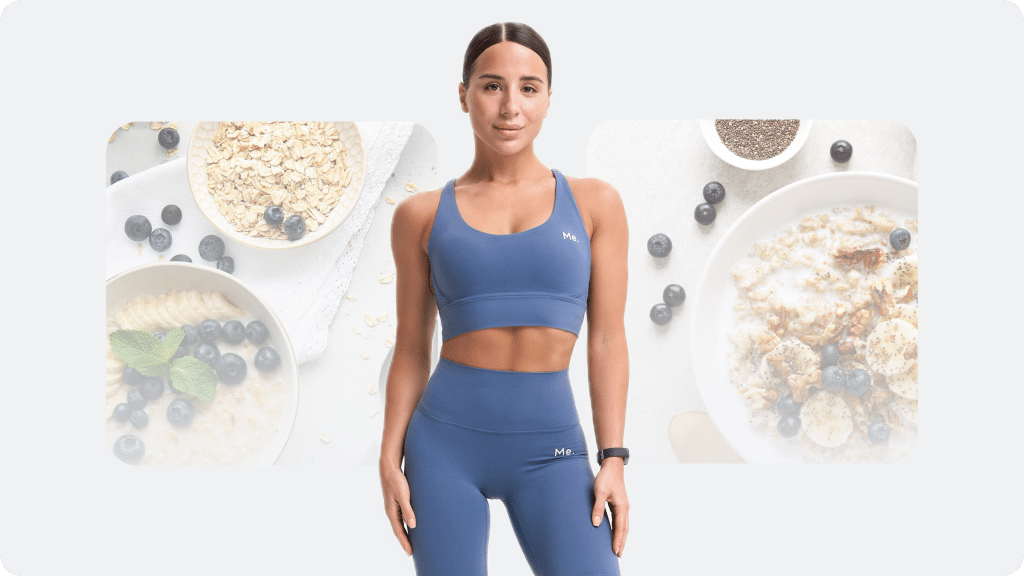The oatmeal diet has been around for decades and originally gained popularity due to its promise of quick weight loss. The diet primarily involves eating only oatmeal for all three meals, together with some fruits and vegetables in between. While it may seem like a simple and easy way to lose weight, there are several reasons why you should avoid trying this fad diet.
The most obvious reason is that it’s an incredibly restrictive and unbalanced diet. Oats are a great source of fiber and complex carbohydrates, but they don’t provide all the necessary nutrients for a healthy body.
By only consuming oats, you’re cutting out essential food groups such as proteins, healthy fats, and other vitamins and minerals. This can lead to deficiencies and serious health consequences in the long term.
The oatmeal diet also lacks scientific evidence to support its claims. While oats are a healthy food choice, there’s no research that proves consuming them in large quantities leads to significant and sustainable weight loss. In fact, crash diets such as this can often have the opposite effect on metabolism and overall health.
Instead of trying fad diets such as the oatmeal diet, it’s important to focus on making long-term lifestyle changes for sustainable weight loss.
Here’s everything you need to know about why the oatmeal diet isn’t a good idea and what you can do instead to lose weight in a healthy way.
Does the 7-Day Oatmeal Diet Work?
There’s no doubt that following the oatmeal diet for seven days can result in weight loss. This is because you’re severely restricting your calorie intake, which leads to a caloric deficit and ultimately weight loss.
However, this weight loss is most likely water weight.
When you first start a restrictive diet, your body burns through its glycogen stores. This process, which is called glycogen depletion, causes a significant loss of water weight (1).
Once you resume your regular eating habits after the 7-day period, the glycogen stores are replenished, and the water weight will come back.
True fat loss is a lengthier process that requires a sustainable and balanced approach to nutrition. The 7-day timeframe of the oatmeal diet is not enough for significant fat loss to occur.
BetterMe will keep you laser-focused on your weight loss journey! Nutrient-packed meal plans, fat-blasting workouts, galvanizing challenges and much more. Try using the app and see for yourself!
How to Prepare Oatmeal for the Oatmeal Diet
To prepare oatmeal for the oatmeal diet, you can follow these general steps:
Ingredients:
- Steel cut oats or rolled oats
- Water
- Optional: egg whites, butter, fruits, nuts, seeds, milk (dairy or non-dairy), cinnamon, maple syrup
Cooking Instructions:
- Boil 1 cup of water.
- Add ¼ cup of steel cut oats or ½ cup of rolled oats.
- Allow the oats to cook for the recommended time (usually around 30 minutes to 1 hour).
- Customize your oatmeal with ingredients such as egg whites, butter, fruits, nuts, seeds, and spices according to your preferences.
There are more nuanced and specific variations of the oatmeal diet, but the basic premise remains the same – eating primarily oatmeal for all meals.
Read More: Best Juices for Weight Loss: The Ultimate Guide
What Happens If You Eat Only Oatmeal 3 Times a Day for a Week?
Eating only oatmeal for three meals a day for a week can lead to several negative effects on your health.
You May Miss out on Essential Nutrients
The biggest issue with the oatmeal diet is the lack of nutritional balance. Oats alone cannot provide all the essential nutrients your body needs to function properly.
By limiting your food intake to just one type of food, you’re depriving your body of important vitamins, minerals, and other nutrients that are necessary for overall health. This can lead to deficiencies and potentially harm your health in the long term.
You May Experience Boredom and Food Aversion
Eating the same food for every meal can quickly become monotonous and unappealing, leading to boredom and potentially food aversion. This can make it difficult to stick to the diet for the entire week, which will result in a higher likelihood of giving up or binge-eating other foods.
Your Digestive System May Be Affected
Eating only oatmeal for three meals a day can be hard on your digestive system. While oats are an excellent source of fiber, too much of it in one sitting can cause bloating, gas, and discomfort (2). You may also experience constipation or diarrhea due to the lack of variety in your diet.
Your Metabolism May Suffer
Crash diets like the oatmeal diet can actually slow down your metabolism instead of boosting it. This is because when you drastically reduce your calorie intake, your body goes into “starvation mode”, where it tries to conserve energy by slowing down your metabolism. This can make it harder for you to lose weight in the long term and potentially lead to weight gain once you resume normal eating habits.
You May Only Experience Temporary Weight Loss
The weight loss experienced during this 7-day period is most likely water weight (1). Once you resume your regular eating habits, the water weight will come back. In some cases, people may even gain more weight than they lost due to overcompensating for the lack of food variety.
How to Lose Belly Fat with Oatmeal
Instead of trying fad diets such as the oatmeal diet, it’s important to focus on making sustainable lifestyle changes for long-term weight loss and maintenance, including:
1. Eat Oats As Part of a Balanced Diet
Oats are a healthy food choice and can provide many health benefits. Their nutritional profile is quite impressive (3), as shown below:
- High in fiber, which can help improve digestion and keep you feeling full
- Rich in essential vitamins and minerals such as iron, magnesium, and zinc, in addition to antioxidants that can help fight against diseases
- A good source of plant-based protein, which makes it a great option for vegetarians and vegans
- Rich in complex carbohydrates, providing sustained energy throughout the day
Instead of relying on oats as your main source of nutrition, incorporate them into a balanced and varied diet for optimal health benefits.
Whether you’re a workout beast or just a beginner making your first foray into the world of fitness and dieting – BetterMe has a lot to offer to both newbies and experts! Install the app and experience the versatility first-hand!
For example, you can eat oatmeal for breakfast with some added fruits and nuts, a hearty salad with oats for lunch, and incorporate them into baked goods or snacks throughout the day. An oat-based diet shouldn’t be restrictive and should be diverse and nourishing.
In our previous blog, What are Rolled Oats? we discussed different ways to prepare oats.
2. Practice Portion Control
While oats are a healthy addition to your diet, it’s important to practice portion control to avoid overeating (4).
A typical serving size of cooked oats is approximately half a cup. You should keep in mind that adding high-calorie toppings such as sugars, syrups, and excessive nuts or dried fruits can increase the caloric content of your meals, potentially negating the weight loss benefits.
Opt for fresh fruits, a drizzle of honey, or a sprinkle of cinnamon to keep the calorie count in check.
3. Use Oats as a Snack Option
Oats can be transformed into healthy snack options that can help curb hunger and maintain energy levels throughout the day.
Consider making energy balls or oat bars with oats, nut butter, seeds, and a small amount of sweetener such as honey or maple syrup. These homemade snacks provide a nutritious alternative to processed snack foods and can help prevent overeating at meal times.
Find more information on snacking on oats in our Are Overnight Oats Healthy? article.
4. Incorporate Protein-Rich Toppings
Enhance the nutritional value of your oats by adding protein-rich toppings such as Greek yogurt, nuts, seeds, or a scoop of protein powder.
Protein is essential for muscle repair and growth and can help keep you fuller for longer, which reduces the likelihood of overindulgence in unhealthy foods (5). For a savory twist, consider mixing oats with eggs or adding them to your favorite salad for a satisfying meal.
6. Practice Calorie Restriction Wisely
Calorie restriction can be an effective method for weight loss, but it should be done wisely to avoid potential negative health impacts. Rather than drastically cutting calories, you should aim for a moderate caloric deficit that allows for steady, sustainable weight loss (6).
Use oats as part of your daily caloric intake plan to ensure you get enough nutrients from other foods while maintaining a manageable calorie count.
7. Commit to Daily Physical Activity
Incorporating oats into your diet should go hand in hand with regular physical activity to maximize weight loss results. You should aim for at least 30 minutes of moderate exercise per day, such as walking, jogging, cycling, or yoga. Physical activity helps burn calories, boost metabolism, and improve overall health (7). A balanced diet combined with daily exercise can lead to more effective and sustainable weight management.
Read More: From TikTok to Table: The Rise and Risks of the Oatzempic Craze
Can You Eat Oatmeal and Still Lose Weight?
You can eat oatmeal and still lose weight. It has several benefits that make it an ideal food for weight loss (8), including:
1. High Fiber Content
Oatmeal contains a high amount of dietary fiber, which helps you feel full and satisfied after eating it. This makes oatmeal a great option for those who are looking to lose weight as it can keep you from snacking or overeating throughout the day.
2. Low in Calories
Oatmeal is relatively low in calories, which makes it a great option for those who are trying to reduce their caloric intake and lose weight. One cup of cooked oatmeal contains only approximately 150-200 calories, depending on the type and brand.
3. Slow Release of Energy
Oatmeal is a complex carbohydrate, which means that it breaks down slowly in your body and releases energy gradually. This can help you feel full and energized for longer periods, reducing the likelihood of snacking or overeating.
4. Rich in Nutrients
In addition to being high in fiber and low in calories, oatmeal is rich in essential vitamins and minerals. It contains iron, magnesium, zinc, and B vitamins, all of which are important for maintaining good health while losing weight.
Here are a few tips to help you incorporate oatmeal into your weight loss diet:
1. Avoid Sugary Additives
To keep your oatmeal healthy and effective for weight loss, avoid adding sugary toppings such as brown sugar, honey, or syrups. Instead, enhance the flavor with natural sweeteners such as fresh fruit, cinnamon, or a small amount of vanilla extract. This helps keep the calorie count low while still providing a satisfying taste.
2. Add Protein for a Balanced Meal
Incorporating a source of protein into your oatmeal can help make it a more balanced meal. Consider adding a scoop of protein powder, a spoonful of Greek yogurt, or a handful of nuts and seeds. Protein helps stabilize blood sugar levels and keeps you full longer, which minimizes cravings throughout the day (5).
3. Practice Portion Control
Although oatmeal is a fantastic food for weight loss, portion control is still important. Stick to a recommended serving size, usually about ½ cup of dry oats. Overeating, even healthy foods, can lead to a calorie surplus and hinder your weight loss goals (4).
4. Use Water or Low-Fat Milk
Cooking your oatmeal with water or low-fat milk is an excellent way to keep the calorie content low. Whole milk or cream can significantly increase the calorie count, so using water or a lower-calorie milk alternative keeps the meal light while still creamy and delicious.
5. Incorporate Variety
Variety is essential to prevent becoming bored with your meal choices. Switch up your oatmeal routine by trying different types of oats such as steel-cut, rolled, or instant. In addition, you can mix in various fruits, nuts, and spices to keep your oatmeal enjoyable and nutritious.
FAQs
Is there a downside to eating oatmeal?
Oatmeal is a nutritious food that rarely causes any adverse effects when consumed in moderation. However, as with any food, there may be downsides to eating oatmeal for some individuals.
Potential Allergic Reactions
Although oats don’t contain gluten, they’re often processed in facilities that also handle wheat, barley, and rye – all of which contain gluten. This cross-contamination can cause issues for those with celiac disease or a gluten intolerance.
In addition, some people may have an allergic reaction to the protein that is found in oats, which is called avenin. Symptoms of an oat allergy may include hives, itching, wheezing, or difficulty breathing.
If you suspect you may have an oat allergy, it’s important to speak with your healthcare provider to determine the best course of action. They may recommend avoiding oats altogether or limiting your intake.
Potential Digestive Issues
Oatmeal is known for its high fiber content, which can be beneficial for digestive health. However, consuming too much fiber can lead to gastrointestinal discomfort such as bloating, gas, and abdominal pain (2).
This is particularly true if someone increases their oatmeal intake suddenly without gradually introducing it into their diet.
To avoid potential digestive issues from oatmeal, it’s important to drink plenty of water and start with smaller portions, gradually increasing the amount over time. It may also be helpful to incorporate other fiber-rich foods into your diet, such as fruits and vegetables.
High Phytic Acid Content
Phytates are compounds that are found in plant-based foods that can interfere with the absorption of certain nutrients, such as iron, zinc, and calcium. Oatmeal is known to have a high phytic acid content, which can prevent these minerals from being properly absorbed by the body (9).
However, this shouldn’t deter you from eating oatmeal. Soaking oats overnight can help reduce their phytate levels and make them more easily digestible. In addition, incorporating other nutrient-rich foods into your diet can help offset any potential negative effects of phytates.
What should I put in oatmeal for weight loss?
Adding whole, nutritious ingredients to oatmeal is a great way to make it even more filling and beneficial for weight loss. Here are some ideas for healthy toppings to add to your oatmeal:
- Fresh fruit: Try adding chopped apples, bananas, strawberries, blueberries, or any other fruit you like. This will add natural sweetness and flavor while also providing essential vitamins and minerals.
- Nuts and seeds: Adding a sprinkle of nuts or seeds such as almonds, walnuts, chia seeds, or flax seeds can increase the protein and healthy fat content of your oatmeal. This helps keep you feeling full for longer periods of time.
- Nut butter: Another way to add healthy fats and protein is to mix in a spoonful of almond butter, peanut butter, or cashew butter. Just make sure to choose varieties without added sugars or oils.
- Greek yogurt: Adding a dollop of plain Greek yogurt to your oatmeal can up the protein even more. It also adds a creamy, tangy flavor that pairs well with fruit.
- Cinnamon and spices: Instead of reaching for sugary toppings such as brown sugar or maple syrup, try adding cinnamon, nutmeg, or other spices to your oatmeal for natural sweetness and flavor.
- Protein powder: If you want to give your oatmeal an extra boost of protein, mix in a scoop of your favorite protein powder. This is particularly helpful for those who are looking to increase their protein intake while keeping calorie count low.
- Vegetables: Yes, vegetables can go in oatmeal too! Try adding grated zucchini or carrots for added nutrients and volume without many extra calories.
- Egg whites: For a savory twist on oatmeal, try stirring in some egg whites toward the end of cooking. This adds even more protein and makes the texture fluffier and creamier.
The Bottom Line
The oatmeal diet is overly restrictive and not sustainable for long-term weight loss. However, incorporating oatmeal into a balanced and varied diet can be beneficial for weight management. Oatmeal is nutritious, high in fiber, and can keep you feeling full for longer periods of time.
By practicing portion control and adding healthy toppings, oatmeal can be a satisfying and enjoyable addition to your meals. As with any food, it’s important to listen to your body and make sure that oats are well-tolerated before you make them a regular part of your diet.
DISCLAIMER:
This article is intended for general informational purposes only and does not serve to address individual circumstances. It is not a substitute for professional advice or help and should not be relied on for making any kind of decision-making. Any action taken as a direct or indirect result of the information in this article is entirely at your own risk and is your sole responsibility.
BetterMe, its content staff, and its medical advisors accept no responsibility for inaccuracies, errors, misstatements, inconsistencies, or omissions and specifically disclaim any liability, loss or risk, personal, professional or otherwise, which may be incurred as a consequence, directly or indirectly, of the use and/or application of any content.
You should always seek the advice of your physician or other qualified health provider with any questions you may have regarding a medical condition or your specific situation. Never disregard professional medical advice or delay seeking it because of BetterMe content. If you suspect or think you may have a medical emergency, call your doctor.
SOURCES:
- Glycogen storage: illusions of easy weight loss, excessive weight regain, and distortions in estimates of body composition (1992,sciencedirect.com)
- PROS AND CONS OF A HIGH-FIBER DIET FOR DIGESTIVE HEALTH (2022,tristategastro.net)
- Nutritional advantages of oats and opportunities for its processing as value added foods – a review (2015,nih.gov)
- Mindful Eating: The Art of Presence While You Eat (2017,nih.gov)
- The role of protein in weight loss and maintenance (2015,sciencedirect.com)
- Calorie Deficit: What To Know (2022,clevelandclinic.org)
- Physical Activity and Your Weight and Health (2023,cdc.gov)
- Is Oatmeal Good for Weight Loss? A Science-Based Exploration (2024,pharmeasy.in)
- Are Anti-Nutrients Harmful? (2022,harvard.edu)












